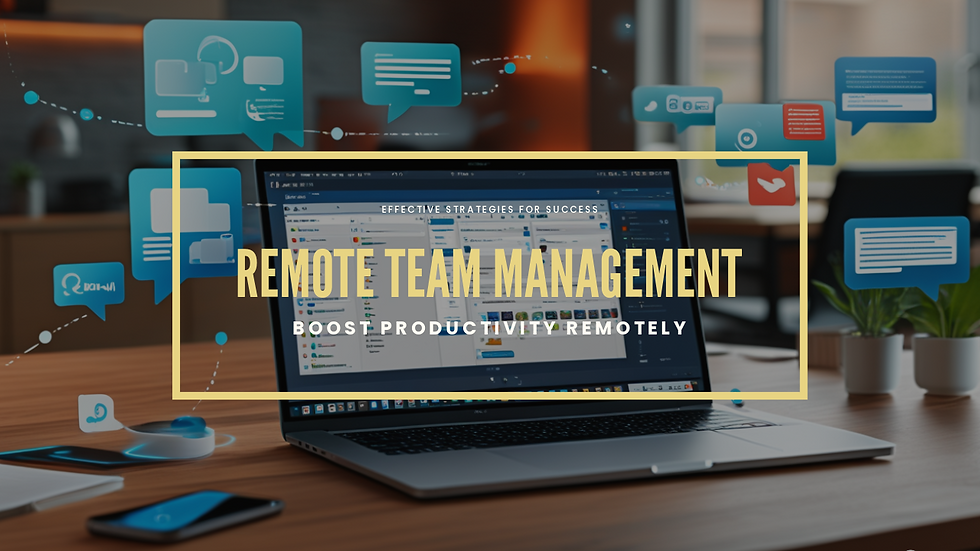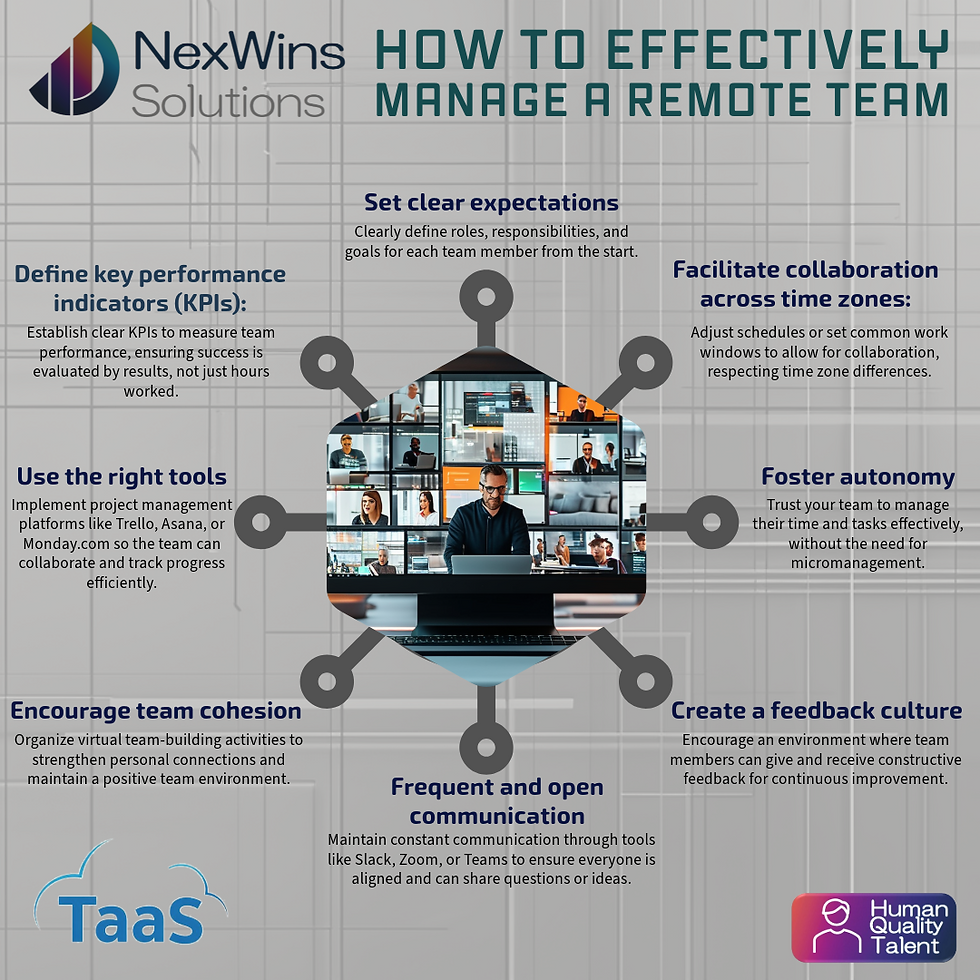How to effectively manage a remote team
- NexWins Pulse

- Sep 30, 2024
- 3 min read
Updated: Oct 6, 2024
In recent years, remote work has transitioned from a trend to a standard practice for businesses worldwide. Managing a remote team brings a new set of challenges and requires a different approach than traditional, in-office management. The key to success lies in fostering communication, building trust, and ensuring accountability. Here are some effective strategies for managing a remote team:

1. Set Clear Expectations from the Start
One of the most important things a remote manager can do is set clear expectations. Team members should know their specific roles, deadlines, and the quality of work expected. This includes:
Clearly defined goals and deliverables.
Guidelines on communication frequency and channels (e.g., email, Slack, video calls).
Working hours, especially if your team is spread across different time zones.
Establishing these expectations early prevents confusion and keeps everyone aligned with the team’s objectives.
2. Communicate Regularly and Transparently
Communication is the backbone of any successful remote team. Since spontaneous face-to-face conversations are not possible, remote managers need to be intentional about communicating regularly. Here’s how to ensure clear communication:
Schedule regular check-ins and team meetings via video calls to keep the team connected.
Use project management tools like Asana or Trello to track progress and ensure visibility.
Encourage the use of instant messaging tools like Slack for quick questions or discussions.
Promote a culture of transparency, where everyone feels comfortable sharing challenges, asking for help, and discussing progress.
A well-communicated team is a well-connected team.
3. Foster Trust and Autonomy
Micromanaging can be particularly tempting in remote environments since it’s harder to see the day-to-day work happening. However, trust is crucial for empowering your team. Encourage autonomy by:
Giving employees the freedom to manage their own schedules as long as deadlines are met.
Setting clear goals and KPIs, and then stepping back to allow the team to achieve them.
Recognizing and rewarding the efforts and achievements of remote team members to build confidence and ownership.
By trusting your team to deliver, you enable them to work more effectively.
4. Utilize the Right Tools and Technology
To effectively manage a remote team, it’s essential to provide your team with the right tools to stay connected and productive. A few essential tools include:
Project management platforms (e.g., Trello, Monday.com) to organize tasks and deadlines.
Communication tools (e.g., Slack, Microsoft Teams) for real-time messaging and file sharing.
Video conferencing tools (e.g., Zoom, Google Meet) to maintain face-to-face interactions.
Document collaboration tools (e.g., Google Docs, Notion) to enable real-time collaboration.
These tools help streamline workflows and keep everyone on the same page, regardless of location.
5. Encourage Team Bonding and Culture
Remote teams can sometimes feel isolated, so it’s essential to foster a sense of belonging. To build a strong remote culture:
Organize virtual team-building activities such as online games, virtual coffee breaks, or team challenges.
Celebrate milestones and achievements as a team, even from a distance.
Promote open discussions about non-work topics, allowing team members to get to know each other on a personal level.
A strong team culture promotes engagement, productivity, and satisfaction.
6. Provide Continuous Feedback and Support
Without regular face-to-face interactions, remote employees may feel disconnected or unsure of their performance. Regular feedback helps to keep everyone on track and feeling supported. Consider:
Setting up weekly or bi-weekly one-on-one meetings to provide individual feedback and discuss personal growth.
Offering constructive feedback in a positive manner that encourages improvement without causing frustration.
Actively listening to team members’ challenges or concerns and offering support where necessary.
A continuous feedback loop helps team members feel valued and engaged.
7. Be Flexible and Understanding
Remote work often comes with unique challenges, such as distractions at home or balancing work with family responsibilities. Flexibility is crucial for maintaining morale and productivity. Remote managers should:
Be understanding of team members’ unique circumstances.
Offer flexible working hours where possible, allowing team members to manage their work-life balance.
Encourage breaks and time off to avoid burnout.
Being flexible shows that you trust your team to manage their time while delivering quality results.

Conclusion:
Managing a remote team requires adaptability, strong communication, and trust. By setting clear expectations, fostering open communication, and utilizing the right tools, remote managers can build a productive, engaged, and connected team—regardless of location. Ultimately, the key to managing a successful remote team is to balance structure with flexibility, ensuring that team members feel supported and motivated to achieve their goals.
%20-%20PNG%20OK.png)


Comments